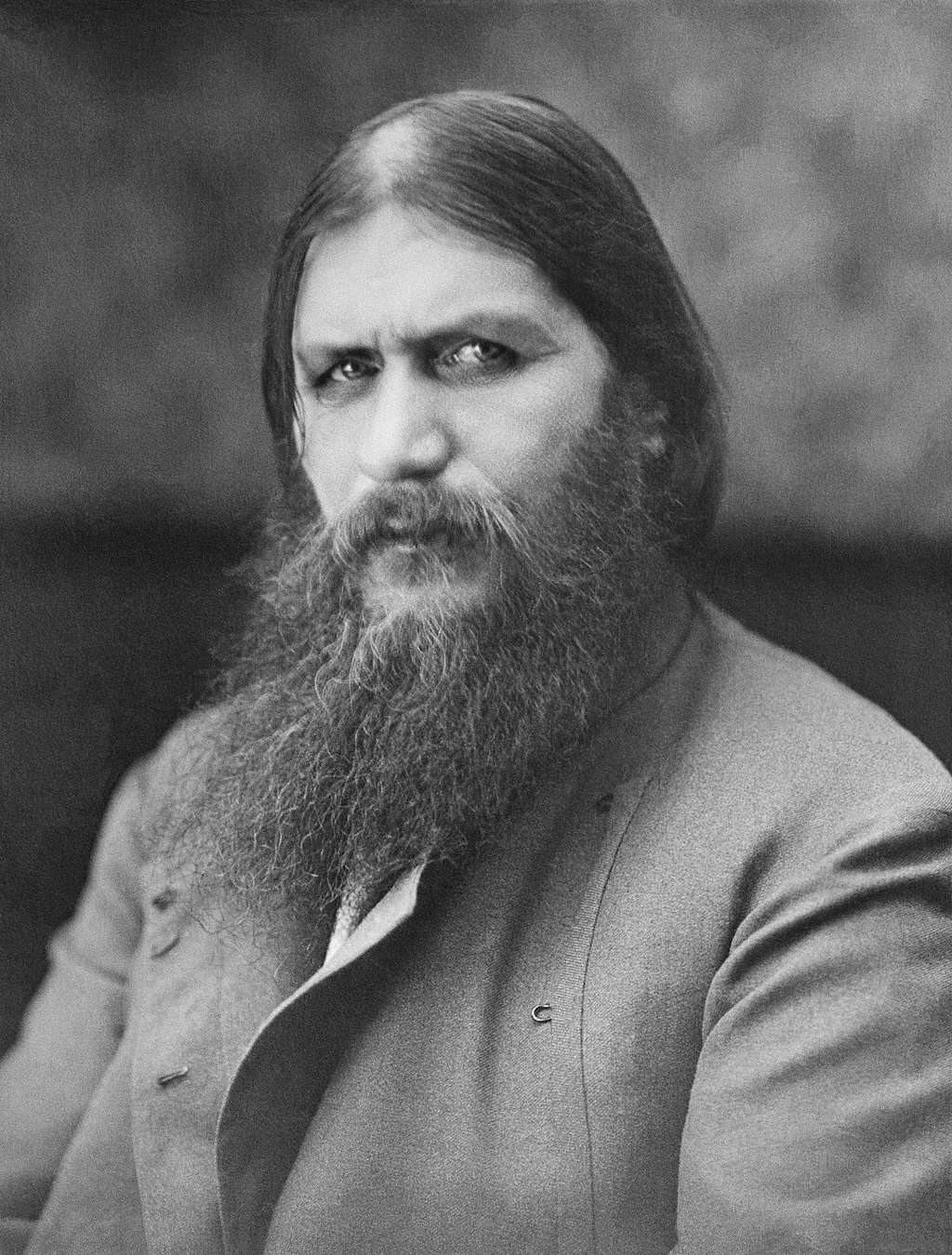
グリゴリー・エフィモヴィチ・ラスプーチン
Grigori Rasputin, 1869-1916

☆ 1906年後半、ラスプーチンはニコライ2世とアレクサンドラの一人息子で血友病に苦しむアレクセイ・ニコラエヴィチのために信仰療法を始めた。ラスプー チンは宮廷で賛否両論を巻き起こす人物で、あるロシア人からは神秘主義者、幻視者、預言者として、またあるロシア人からは宗教的詐欺師として見られてい た。ニコライが第一次世界大戦に参戦するロシア帝国軍を監督するためにサンクトペテルブルクを離れた1915年、ラスプーチンの権力は頂点に達した。ニコ ライ不在の間、ラスプーチンとアレクサンドラはロシア帝国全体に影響力を強めていた。しかし、東部戦線でロシアの軍事的敗北が重なるにつれ、二人の人物は ますます不人気となり、1916年12月30日[西暦12月17日]早朝、皇室への影響力に反対する保守的なロシア貴族のグループによって、ラスプーチン は暗殺された。
| Grigori Yefimovich
Rasputin (/ræˈspjuːtɪn/; Russian: Григо́рий Ефи́мович Распу́тин
[ɡrʲɪˈɡorʲɪj jɪˈfʲiməvʲɪtɕ rɐˈsputʲɪn]; 21 January [O.S. 9 January]
1869 – 30 December [O.S. 17 December] 1916) was a Russian mystic and
faith healer. He is best known for having befriended the imperial
family of Nicholas II, the last Emperor of Russia, through whom he
gained considerable influence in the final years of the Russian Empire. Rasputin was born to a family of peasants in the Siberian village of Pokrovskoye, located within Tyumensky Uyezd in Tobolsk Governorate (present-day Yarkovsky District in Tyumen Oblast). He had a religious conversion experience after embarking on a pilgrimage to a monastery in 1897 and has been described as a monk or as a strannik (wanderer or pilgrim), though he held no official position in the Russian Orthodox Church. In 1903 or in the winter of 1904–1905, he travelled to Saint Petersburg and captivated a number of religious and social leaders, eventually becoming a prominent figure in Russian society. In November 1905, Rasputin met Nicholas II and his empress consort, Alexandra Feodorovna. In late 1906, Rasputin began acting as a faith healer for Nicholas' and Alexandra's only son, Alexei Nikolaevich, who suffered from haemophilia. He was a divisive figure at court, seen by some Russians as a mystic, visionary and prophet, and by others as a religious charlatan. The extent of Rasputin's power reached an all-time high in 1915, when Nicholas left Saint Petersburg to oversee the Imperial Russian Army as it was engaged in the First World War. In his absence, Rasputin and Alexandra consolidated their influence across the Russian Empire. However, as Russian military defeats mounted on the Eastern Front, both figures became increasingly unpopular, and in the early morning of 30 December [O.S. 17 December] 1916, Rasputin was assassinated by a group of conservative Russian noblemen who opposed his influence over the imperial family. Historians often suggest that Rasputin's scandalous and sinister reputation helped discredit the Tsarist government, thus precipitating the overthrow of the House of Romanov shortly after his assassination. Accounts of his life and influence were often based on hearsay and rumor; he remains a mysterious and captivating figure in popular culture.[1] |
Grigori Yefimovich Rasputin
(/ræˈspjuːtɪn/; Russian: Григо́рий Ефи́мович Распу́тин [ɡrʲɪˈɡorʲɪj
jɪˈfʲiməvʲɪtɕ rɐˈsputʲɪn]; 21 January [O. S. 1月9日] 1869年 - 12月30日[O.S.
12月17日]
1916年)はロシアの神秘主義者、信仰療法家である。最後のロシア皇帝ニコライ2世の皇族と親交を結んだことで知られ、ニコライ2世を通じてロシア帝国
末期に大きな影響力を持った。 ラスプーチンはシベリアのポクロフスコエ村の農民の家に生まれた。1897年、修道院への巡礼の旅に出た後、宗教的な回心体験をし、修道士あるいはスト ラーニク(放浪者、巡礼者)と形容されているが、ロシア正教会の公式役職には就いていなかった。1903年か1904-1905年の冬にサンクトペテルブ ルクに渡り、多くの宗教的、社会的指導者を魅了し、やがてロシア社会で著名な人物となった。1905年11月、ラスプーチンはニコライ2世とその皇后アレ クサンドラ・フェオドロヴナに会った。 1906年後半、ラスプーチンはニコライ2世とアレクサンドラの一人息子で血友病に苦しむアレクセイ・ニコラエヴィチのために信仰療法を始めた。ラスプー チンは宮廷で賛否両論を巻き起こす人物で、あるロシア人からは神秘主義者、幻視者、預言者として、またあるロシア人からは宗教的詐欺師として見られてい た。ニコライが第一次世界大戦に参戦するロシア帝国軍を監督するためにサンクトペテルブルクを離れた1915年、ラスプーチンの権力は頂点に達した。ニコ ライ不在の間、ラスプーチンとアレクサンドラはロシア帝国全体に影響力を強めていた。しかし、東部戦線でロシアの軍事的敗北が重なるにつれ、二人の人物は ますます不人気となり、1916年12月30日[西暦12月17日]早朝、皇室への影響力に反対する保守的なロシア貴族のグループによって、ラスプーチン は暗殺された。 歴史家はしばしば、ラスプーチンのスキャンダラスで不吉な評判がツァーリ政府の信用を失墜させ、その結果、暗殺直後にロマノフ家の転覆を促したと指摘す る。彼の人生と影響力に関する記述は、伝聞や噂に基づくことが多く、大衆文化の中では、彼は謎めいた魅惑的な人物であり続けている[1]。 |
Early life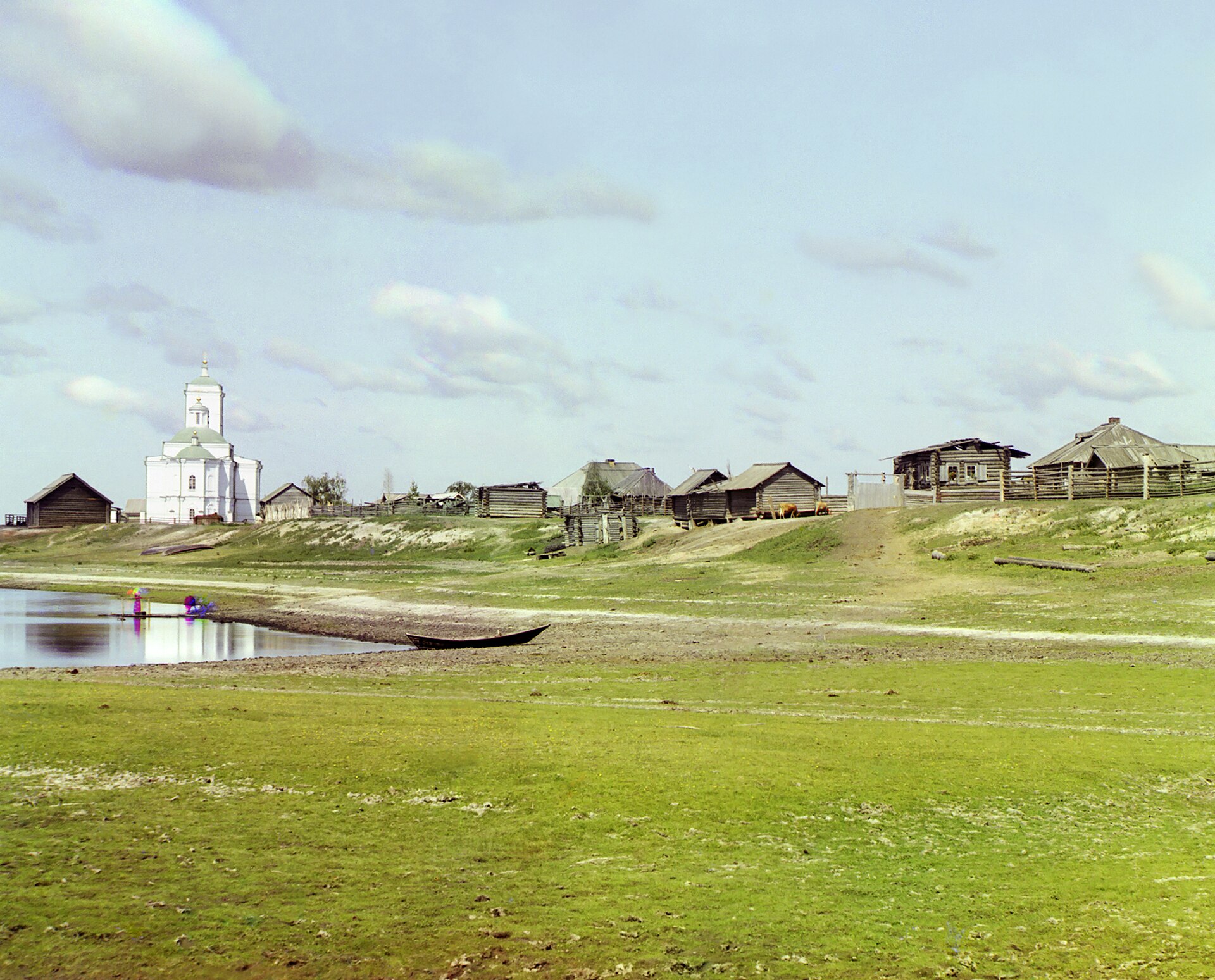 Pokrovskoye in 1912 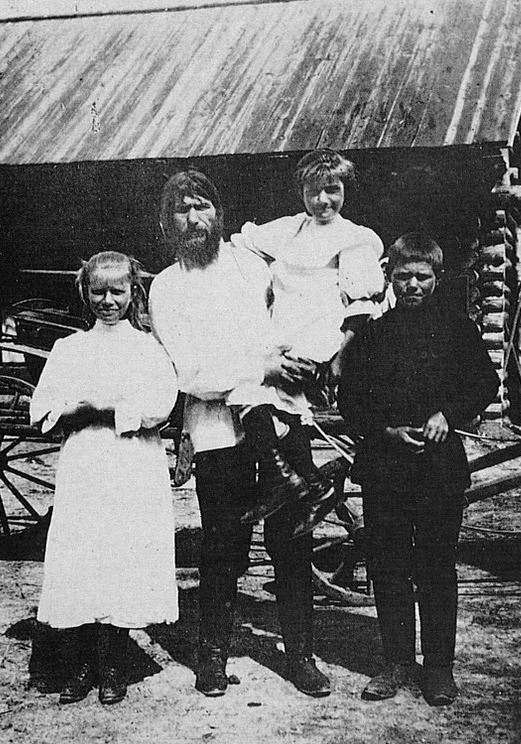 Rasputin with his children Grigori Yefimovich Rasputin was born a peasant in the small village of Pokrovskoye, along the Tura River in the Tobolsk Governorate (now Tyumen Oblast) in the Russian Empire.[2] According to official records, he was born on 21 January [O.S. 9 January] 1869 and christened the following day.[3] He was named for St. Gregory of Nyssa, whose feast was celebrated on 10 January.[4] There are few records of Rasputin's parents. His father, Yefim (1842 – 1916),[4] was a peasant farmer and church elder who had been born in Pokrovskoye and married Rasputin's mother, Anna Parshukova (c. 1840 – 1906), in 1863. Yefim also worked as a government courier, ferrying people and goods between Tobolsk and Tyumen.[5][4] The couple had seven other children, all of whom died in infancy and early childhood; there may have been a ninth child, Feodosiya. According to historian Joseph T. Fuhrmann, Rasputin was certainly close to Feodosiya and was godfather to her children, but "the records that have survived do not permit us to say more than that".[5] According to historian Douglas Smith, Rasputin's youth and early adulthood are "a black hole about which we know almost nothing", though the lack of reliable sources and information did not stop others from fabricating stories about Rasputin's parents and his youth after his rise to prominence.[6] Historians agree, however, that like most Siberian peasants, including his mother and father, Rasputin was not formally educated and remained illiterate well into his early adulthood.[4][7] Local archival records suggest that he had a somewhat unruly youth—possibly involving drinking, small thefts and disrespect for local authorities—but contain no evidence of his being charged with stealing horses, blasphemy or bearing false witness, all major crimes later imputed to him as a young man.[8] In 1886, Rasputin traveled to Abalak, some 250 km east-northeast of Tyumen and 2,800 km east of Moscow, where he met a peasant girl named Praskovya Dubrovina. After a courtship of several months, they married in February 1887. Praskovya remained in Pokrovskoye throughout Rasputin's later travels and rise to prominence, and remained devoted to him until his death. The couple had seven children, though only three survived to adulthood: Dmitry (b. 1895), Maria (b. 1898) and Varvara (b. 1900).[9] |
生い立ち 1912年のポクロフスコエ  子供たちとラスプーチン グリゴリ・イェフィモヴィチ・ラスプーチンは、ロシア帝国のトボリスク県(現・チュメン州)のトゥーラ川沿いにあるポクロフスコエという小さな村の農民と して生まれた[2]。公式記録によると、彼は1869年1月21日(西暦1月9日)に生まれ、翌日に洗礼を受けた[3]。 ラスプーチンの両親に関する記録はほとんどない。父イェフィム(1842年 - 1916年)は農民であり、教会の長老であった。ポクロフスコエで生まれ、1863年にラスプーチンの母アンナ・パルシュコヴァ(1840年頃 - 1906年)と結婚した。イエフィムはまた、政府の運び屋として、トボリスクとチュメンの間で人や物を運ぶ仕事をしていた[5][4]。夫妻には他に7人 の子供がいたが、全員が幼児期と幼年期に死亡した。歴史家のジョセフ・T・フールマンによると、ラスプーチンはフェオドーシヤと親しかったことは確かで、 彼女の子供たちの名付け親でもあったが、「残っている記録ではそれ以上のことは言えない」[5]。 歴史家ダグラス・スミスによれば、ラスプーチンの青年期と成人期初期は「ほとんど何も分かっていないブラックホール」であるが、信頼できる資料や情報がな いため、ラスプーチンの両親や出世した後の青年期についての話を捏造する者が後を絶たなかった[6]。 しかし、ラスプーチンは、彼の母や父を含む多くのシベリアの農民と同様に、正式な教育を受けておらず、成人期初期まで文盲のままであったという点では、歴 史家たちの意見は一致している[4]。 [4][7]地元の古文書記録は、彼が少々手に負えない少年時代を過ごしたことを示唆しており、おそらく飲酒、小さな窃盗、地元当局に対する無礼などが あったのだろうと思われるが、馬泥棒、冒涜、偽証罪など、後に彼が青年時代に犯したとされる重大な罪に問われた形跡はない[8]。 1886年、ラスプーチンはチュメンの東北東約250km、モスクワの東2,800kmに位置するアバラクを訪れ、そこでプラスコヴィア・ドゥブロヴィナ という農民の娘と出会った。数ヶ月の求婚の後、二人は1887年2月に結婚した。プラスコーヴィヤは、ラスプーチンのその後の旅行と出世の間、ポクロフス コエに留まり、ラスプーチンが亡くなるまで献身的に尽くした。夫妻は7人の子供をもうけたが、成人まで生き延びたのは3人だけだった: ドミトリー(1895年生まれ)、マリア(1898年生まれ)、ヴァルヴァラ(1900年生まれ)である[9]。 |
| Religious conversion In 1897, Rasputin developed a renewed interest in religion and left Pokrovskoye to go on a pilgrimage. His reasons are unclear; according to some sources, he left the village to escape punishment for his role in horse theft.[10] Other sources suggest Rasputin had a vision of the Virgin Mary or of St. Simeon of Verkhoturye, while still others suggest that his pilgrimage was inspired by a young theological student, Melity Zaborovsky.[11] Whatever his reasons, Rasputin cast off his old life: he was 28 years old, married ten years, with an infant son and another child on the way. According to Smith, his decision "could only have been occasioned by some sort of emotional or spiritual crisis".[12] Rasputin had undertaken earlier, shorter pilgrimages to the Holy Znamensky Monastery at Abalak and to Tobolsk's cathedral, but his visit to the St. Nicholas Monastery at Verkhoturye in 1897 transformed him.[13] There, he met and was "profoundly humbled" by a starets (elder) known as Makary. Rasputin may have spent several months at Verkhoturye, and it was perhaps here that he learned to read and write. However, he later claimed that some of the monks at Verkhotuyre engaged in homosexuality and criticized monastic life as too coercive.[14] He returned to Pokrovskoye a changed man, looking disheveled and behaving differently. He became a vegetarian, swore off alcohol, and prayed and sang much more fervently than he had in the past.[15] Rasputin spent the years that followed as a strannik (a holy wanderer or pilgrim), leaving Pokrovskoye for months or even years at a time to wander the country and visit a variety of holy sites.[16] It is possible he wandered as far as Mount Athos—the center of Eastern Orthodox monastic life—in 1900.[17] By the early 1900s, Rasputin had developed a small circle of followers, primarily family members and other local peasants, who prayed with him on Sundays and other holy days when he was in Pokrovskoye. Building a makeshift chapel in Yefim's root cellar—Rasputin was still living within his father's household at the time—the group held secret prayer meetings there. These meetings were the subject of some suspicion and hostility from the village priest and other villagers. It was rumored that female followers were ceremonially washing Rasputin before each meeting, that the group sang strange songs, and even that Rasputin had joined the Khlysty, a religious sect whose ecstatic rituals were rumored to include self-flagellation and sexual orgies.[18][19] According to Fuhrmann, however, "repeated investigations failed to establish that Rasputin was ever a member of the sect", and rumors that he was a Khlyst appear to have been unfounded.[20] |
宗教への改宗 1897年、ラスプーチンは宗教に再び関心を抱くようになり、巡礼の旅に出るためにポクロフスコエを離れた。ある資料によれば、彼は馬の窃盗に関与した罰 から逃れるために村を出たとされる[10]。他の資料によれば、ラスプーチンは聖母マリアやヴェルクホートゥリエの聖シメオンの幻を見たということであ り、また他の資料によれば、彼の巡礼は若い神学生メリティ・ザボロフスキーに触発されたものであった[11]。スミスによれば、彼の決断は「ある種の感情 的、あるいは精神的な危機によってもたらされたとしか思えない」[12]。 ラスプーチンはそれ以前にも、アバラクの聖ズナメンスキー修道院やトボリスクの大聖堂への短い巡礼を行ったことがあったが、1897年にヴェルホトゥリエ の聖ニコラス修道院を訪れたことで、彼は一変した[13]。 そこで彼はマカリーと呼ばれるスタレツ(長老)に出会い、「深く謙虚に」させられた。ラスプーチンはヴェルホトゥリエで数ヶ月を過ごし、おそらくここで読 み書きを学んだのだろう。しかし、後に彼は、ヴェルクホトゥイエの修道士の中には同性愛に手を染める者もいたと主張し、修道院生活はあまりに強制的である と批判した[14]。彼は変わり果てた姿でポクロフスコエに戻った。彼は菜食主義者となり、アルコールを断ち、以前よりもずっと熱心に祈り、歌った [15]。 ラスプーチンはその後の数年間をストラーニク(聖なる放浪者、巡礼者)として過ごし、一度に数ヶ月から数年間ポクロフスコエを離れて国内を放浪し、様々な 聖地を訪れた[16]。 1900年には東方正教会の修道院生活の中心地であるアトス山まで放浪した可能性がある[17]。 1900年代初頭までに、ラスプーチンは主に家族や地元の農民を中心とした小さな信者の輪を作り、ポクロフスコエにいるときは日曜日やその他の聖なる日に 彼とともに祈りを捧げた。当時ラスプーチンはまだ父親の家に住んでいたため、イエフィムの根小屋に間に合わせの礼拝堂を作り、そこで秘密の祈祷会を開い た。この集会は、村の司祭や他の村人から疑惑と敵意を向けられることもあった。女性信者が集会の前にラスプーチンを儀式的に洗っていたこと、集団が奇妙な 歌を歌っていたこと、さらにはラスプーチンが自涜と性的乱交を含む恍惚の儀式が噂されていた宗教宗派であるクリシュティに加わっていたことなどが噂された [18][19]。 しかし、フールマンによれば、「度重なる調査でも、ラスプーチンが宗派のメンバーであったことを立証することはできなかった」とし、彼がクリシュティで あったという噂は根拠のないものであったようだ[20]。 |
Rise to prominence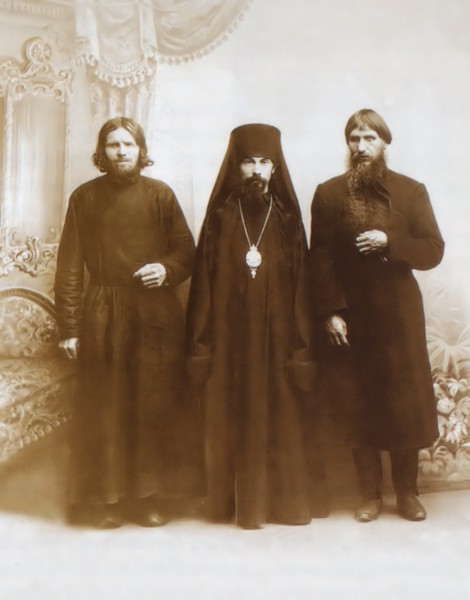 Makary, Bishop Theofan and Rasputin, 1909 Word of Rasputin's activity and charisma began to spread in Siberia during the early 1900s.[18] At some point during 1904 or 1905, he traveled to the city of Kazan, where he acquired a reputation as a wise starets who could help people resolve their spiritual crises and anxieties.[21] Despite rumors that Rasputin was having sex with female followers,[22] he made a favorable impression on several local religious leaders. Among these were Archimandrite Andrei and Bishop Chrysthanos, who gave Rasputin a letter of recommendation to Bishop Sergei, the rector of the theological seminary at the Alexander Nevsky Monastery, and arranged for him to travel to Saint Petersburg.[23][24][25] Upon arriving at the Alexander Nevsky Lavra, Rasputin was introduced to church leaders, including Archimandrite Theofan, inspector of the theological seminary, who was well-connected in Saint Petersburg society and later served as confessor to the imperial family.[26][27] Theofan was so impressed with Rasputin that he invited him to stay in his home; he went on to become one of Rasputin's most important friends in Saint Petersburg,[26] gaining him entry to many of the influential salons where the local aristocracy gathered for religious discussions. It was through these meetings that Rasputin attracted some of his early and influential followers—many of whom would later turn against him.[28] Alternative religious movements such as spiritualism and theosophy had become popular among Saint Petersburg's aristocracy before Rasputin's arrival, and many of the aristocracy were intensely curious about the occult and the supernatural.[29] Rasputin's ideas and "strange manners" made him the subject of intense curiosity among the city's elite, who according to Fuhrmann were "bored, cynical, and seeking new experiences" during this period.[26] Rasputin's appeal may have been enhanced by the fact that he was also a native Russian, unlike other self-described "holy men" such as Nizier Anthelme Philippe and Gérard Encausse, who had previously been popular in Saint Petersburg.[27] According to Fuhrmann, Rasputin stayed in Saint Petersburg for only a few months on his first visit and returned to Pokrovskoye in the fall of 1903.[30] Smith, however, argues that it is impossible to know whether Rasputin stayed in Saint Petersburg or returned to Pokrovskoye at some point between his first arrival and 1905.[31] Regardless, by 1905 Rasputin had formed friendships with several members of the aristocracy, including the "Black Princesses", Militsa and Anastasia of Montenegro, who had married cousins of Tsar Nicholas II (Grand Duke Peter Nikolaevich and Prince George Maximilianovich Romanowsky) and were instrumental in introducing Rasputin to the tsar and his family.[27][32] Rasputin first met Nicholas on 1 November 1905, at the Peterhof Palace. The tsar recorded the event in his diary, writing that he and his empress consort, Alexandra Feodorovna, had "made the acquaintance of a man of God – Grigory, from Tobolsk province".[31] Rasputin returned to Pokrovskoye shortly after their first meeting and did not return to Saint Petersburg until July 1906.[33] On his return, he sent Nicholas a telegram asking to present the tsar with an icon of St. Simeon of Verkhoturye. He met with Nicholas and Alexandra on 18 July and again in October, when he first met their children.[34] At some point, Nicholas and Alexandra became convinced that Rasputin possessed the miraculous power to heal their only son, Tsesarevich Alexei Nikolaevich, who suffered from haemophilia. Historians disagree over when this happened: according to Orlando Figes, Rasputin was first introduced to the tsar and tsarina as a healer who could help their son in November 1905,[35] while Joseph T. Fuhrmann has speculated that it was in October 1906 that Rasputin was first asked to pray for the health of Alexei.[36] |
出世する マカリ、テオファン司教とラスプーチン、1909年 ラスプーチンの活動やカリスマ性の噂は、1900年代初頭にシベリアで広まり始めた[18]。1904年か1905年のある時点で、彼はカザン市を訪れ、 そこで人々の精神的な危機や不安を解決することができる賢明な聖職者として評判になった[21]。 ラスプーチンが女性の信者とセックスしているという噂にもかかわらず[22]、彼は地元の何人かの宗教指導者に好印象を与えた。その中にはアンドレイ大司 教とクリスタノス司教がおり、彼らはラスプーチンにアレクサンドル・ネフスキー修道院の神学院長であるセルゲイ司教への推薦状を渡し、サンクトペテルブル クへの渡航を手配した[23][24][25]。 アレクサンドル・ネフスキー大修道院に到着すると、ラスプーチンは、サンクトペテルブルク社交界に人脈があり、後に皇室の告解官を務めた神学院の監察官テ オファン大修道士を含む教会の指導者たちに紹介された。 [26][27]テオファンはラスプーチンに感銘を受け、彼を自宅に招いた。彼はその後、サンクトペテルブルクにおけるラスプーチンの最も重要な友人の一 人となり[26]、地元の貴族が宗教的な議論をするために集まる影響力のあるサロンの多くに彼を参加させた。こうした会合を通じて、ラスプーチンは初期の 有力な信奉者たちを惹きつけたが、その信奉者の多くは後にラスプーチンに反旗を翻すことになる[28]。 ラスプーチンが到着する以前から、サンクトペテルブルクの貴族の間ではスピリチュアリズムや神智学といったオルタナティブな宗教運動が流行しており、貴族 の多くはオカルトや超自然的なものに強い好奇心を抱いていた[29]。ラスプーチンの思想と「奇妙な作法」は、フアーマンによればこの時期に「退屈し、冷 笑的で、新しい経験を求めていた」この街のエリートたちの間で強い好奇心の対象となった。 [26] ラスプーチンの魅力は、それまでサンクトペテルブルクで人気を博していたニジエ・アンテルム・フィリップやジェラール・エンコースといった自称「聖人」と は異なり、彼もまた生粋のロシア人であったという事実によって高められたのかもしれない[27]。 しかし、スミスは、ラスプーチンがサンクトペテルブルクに滞在したのか、それとも最初の到着から1905年までのある時点でポクロフスコエに戻ったのかを 知ることは不可能であると論じている[30]。 [31]ともかく、1905年までにラスプーチンはモンテネグロのミリツァとアナスタシアという「黒い王女」を含む何人かの貴族と親交を結んでいた。彼女 たちはニコライ2世の従兄弟(ピーター・ニコラエヴィチ大公とジョージ・マクシミリアノヴィッチ・ロマノフスキー王子)と結婚しており、ラスプーチンを皇 帝とその家族に紹介するのに役立った[27][32]。 ラスプーチンは1905年11月1日、ピョートホーフ宮殿でニコライに初めて会った。ラスプーチンはニコライに、ヴェルホトゥリエの聖シメオンのイコンを 贈るよう電報を送った。7月18日にはニコライとアレクサンドラに会い、10月には彼らの子供たちに初めて会った[34]。 ある時点でニコライとアレクサンドラは、ラスプーチンが血友病に苦しむ一人息子のツェサレヴィチ・アレクセイ・ニコラエヴィチを癒す奇跡的な力を持ってい ると確信した。オーランド・フィゲスによれば、ラスプーチンは1905年11月に彼らの息子を助けることができる治療者としてツァーリナとツァーリナに初 めて紹介された[35]。一方、ジョセフ・T・フールマンは、ラスプーチンがアレクセイの健康のために祈るよう最初に依頼されたのは1906年10月だっ たと推測している[36]。 |
Healer to Alexei Nikolaevich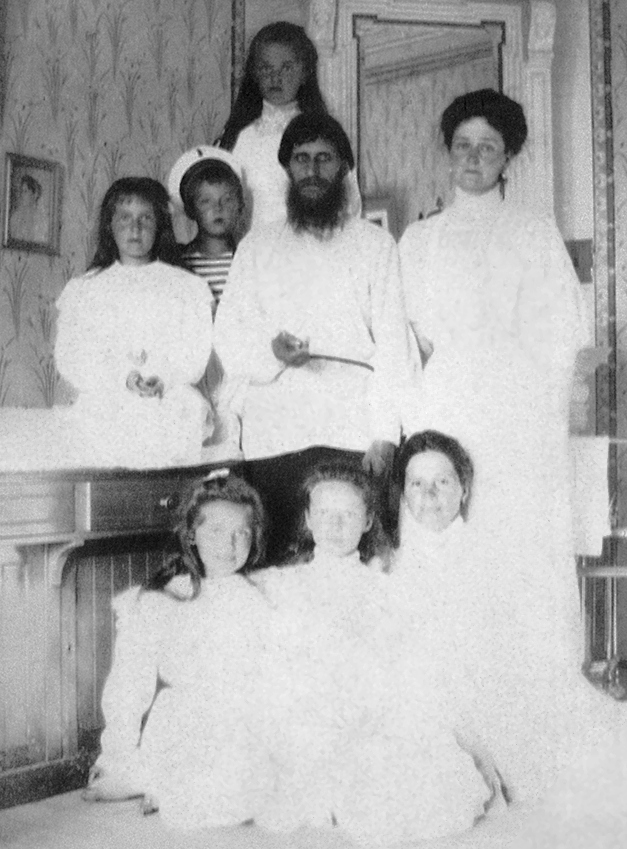 Alexandra Feodorovna with her children, Rasputin and the nurse Maria Ivanova Vishnyakova, 1908 Much of Rasputin's influence with the imperial family stemmed from the belief by Alexandra and others that he had on several occasions eased Alexei's pain and stopped his bleeding. According to historian Marc Ferro, the tsarina had a "passionate attachment" to Rasputin, believing he could heal her son's affliction.[37] Harold Shukman wrote that Rasputin became "an indispensable member of the royal entourage".[38] It is unclear when Rasputin first learned of Alexei's haemophilia, or when he first acted as a healer. He may have been aware of Alexei's condition as early as October 1906,[36] and was summoned by Alexandra to pray for the tsarevich when he had an internal hemorrhage in the spring of 1907. Alexei recovered the next morning.[39] Alexandra's friend Anna Vyrubova became convinced that Rasputin had miraculous powers shortly thereafter and became one of his most influential advocates.[40][41] In November 1906, Rasputin suddenly paid a visit to the Baratynsky family in Kazan and told them he could read people's minds. Olga Ilyin's description of Rasputin and his behavior in "Visits to the Imperial Court" is a small but no doubt valuable contribution to history.[42] At the very beginning of dinner, when Nastya was about to put a plate of soup in front of Rasputin, he wanted to get out a comb, and he began to run it through his oily hair. The plate was quickly cleared away, and Nastya waited with stony disdain for him to finish his task. [43] During the summer of 1912, Alexei developed a hemorrhage in his thigh and groin after a jolting carriage ride near the imperial hunting grounds at Spała, which caused a large hematoma.[44] In severe pain and delirious with fever, the tsarevich appeared close to death.[45] In desperation, Alexandra asked Vyrubova to send Rasputin (who was in Siberia) a telegram, asking him to pray for Alexei.[46] Rasputin wrote back quickly, telling the tsarina that "God has seen your tears and heard your prayers. Do not grieve. The Little One will not die. Do not allow the doctors to bother him too much."[46] The next morning, Alexei's condition was unchanged, but Alexandra was encouraged by the message and regained some hope that he would survive. His bleeding stopped the following day.[46] Dr. S. P. Fedorov, one of the physicians who attended Alexei, admitted that "the recovery was wholly inexplicable from a medical point of view."[47] Later, Dr. Fedorov admitted that Alexandra could not be blamed for seeing Rasputin as a miracle man: "Rasputin would come in, walk up to the patient, look at him, and spit. The bleeding would stop in no time.... How could the empress not trust Rasputin after that?"[48] Historian Robert K. Massie has called Alexei's recovery "one of the most mysterious episodes of the whole Rasputin legend".[46] The cause of his recovery is unclear: Massie speculated that Rasputin's suggestion not to let doctors disturb Alexei had aided his recovery by allowing him to rest and heal, or that his message may have aided Alexei's recovery by calming his mother and reducing the tsarevich's emotional stress.[49] Alexandra believed that Rasputin had performed a miracle, and concluded that he was essential to Alexei's survival.[50] Some writers and historians, such as Ferro, claim that Rasputin stopped Alexei's bleeding on other occasions through hypnosis.[37] Still other historians–including memoirist Pierre Gilliard, Alexei's French-language tutor–have speculated that Rasputin controlled Alexei's bleeding by disallowing the administration of aspirin, then widely used to relieve pain, but unknown as an anti-clotting agent until the 1950s.[51] |
アレクセイ・ニコラエヴィチの治療者 アレクサンドラ・フェオドーロヴナとその子供たち、ラスプーチンと看護婦のマリア・イワノヴァ・ヴィシュニャコワ、1908年 皇室に対するラスプーチンの影響力の多くは、アレクセイの痛みを和らげ、出血を止めたことが何度かあったとアレクサンドラらが信じていたことに由来する。 歴史家のマルク・フェロによれば、ツァリーナはラスプーチンに「情熱的な愛着」を抱き、彼が息子の病気を治すことができると信じていた[37]。 ハロルド・シュクマンは、ラスプーチンが「王室の側近として欠くことのできない存在」となったと記している[38]。 ラスプーチンがアレクセイの血友病を知ったのはいつなのか、また彼が治療者として初めて行動したのはいつなのかは不明である。1906年10月にはアレク セイの病状に気づいていた可能性があり[36]、1907年春に内出血を起こした際にはアレクサンドラに呼ばれ、ツァレヴィチのために祈った。アレクセイ は翌朝には回復した[39]。アレクサンドラの友人アンナ・ヴィルボーヴァは、その直後からラスプーチンに奇跡的な力があると確信するようになり、最も影 響力のある擁護者の一人となった[40][41]。 1906年11月、ラスプーチンは突然カザンのバラチンスキー家を訪問し、人の心を読むことができると話した。オルガ・イリインが『宮廷訪問』の中でラスプーチンとその行動について記述しているが、これは小さいながらも歴史への貴重な貢献であることは間違いない[42]。 夕食の一番最初、ナスチャがラスプーチンの前にスープの皿を置こうとしたとき、彼は櫛を取り出そうとし、脂ぎった髪に櫛を通し始めた。皿はすぐに片付けられ、ナスチャは彼が自分の仕事を終えるのを石のように軽蔑して待った。[43] 1912年の夏、アレクセイはスパワの皇室の狩猟場の近くで馬車に揺られ、大腿部と鼠径部に出血を起こし、大きな血腫ができた[44]。 [45]絶望の淵に立たされたアレクサンドラは、シベリアにいたラスプーチンにアレクセイのために祈るよう電報を打つようヴィルヴォヴァに頼んだ [46]。悲しむことはない。幼子は死なない。翌朝、アレクセイの容態に変化はなかったが、アレクサンドラはそのメッセージに励まされ、彼が助かるという 希望を取り戻した。翌日、彼の出血は止まった[46]。アレクセイに付き添った医師の一人であるS.P.フェドロフ医師は、「回復は医学的見地からは全く 不可解なものであった」と認めた[47]。後にフェドロフ医師は、アレクサンドラがラスプーチンを奇跡の人として見たことを責めることはできないと認め た: 「ラスプーチンはやってきて、患者に近づき、彼を見て、唾を吐いた。ラスプーチンは患者に近づき、目を見て唾を吐いた。その後、皇后がラスプーチンを信用 しないわけがない」[48]。 歴史家のロバート・K・マッシーは、アレクセイの回復を「ラスプーチン伝説全体の中で最も謎めいたエピソードのひとつ」と呼んでいる[46]。 [マッシーは、医師たちにアレクセイの邪魔をさせないようにというラスプーチンの提案が、アレクセイを休ませ回復させるのに役立ったのではないか、あるい は、彼のメッセージが母親を落ち着かせ、ツァレヴィチの精神的ストレスを軽減することでアレクセイの回復を助けたのではないかと推測している[49]。ア レクサンドラは、ラスプーチンが奇跡を起こしたと信じ、アレクセイの生存にはラスプーチンが不可欠であったと結論づけた。 [50] フェロのような何人かの作家や歴史家は、ラスプーチンが催眠術によってアレクセイの出血を止めたと主張している[37]。 さらに他の歴史家-アレクセイのフランス語の家庭教師であった回想録作家のピエール・ジリアールを含む-は、当時痛みを和らげるために広く使用されていた が、1950年代まで抗血液凝固剤として知られていなかったアスピリンの投与を禁止することによって、ラスプーチンがアレクセイの出血をコントロールした と推測している[51]。 |
| Relationship with the Imperial Children Alexei and his siblings were also taught to view Rasputin as "our friend" and to share confidences with him. In the autumn of 1907, their aunt, Grand Duchess Olga Alexandrovna, was escorted to the nursery by Nicholas to meet Rasputin. Maria, her sisters and brother Alexei were all wearing their long white nightgowns. "All the children seemed to like him," Olga Alexandrovna recalled. "They were completely at ease with him."[52] Rasputin's friendship with the tsar's children was evident in the messages he sent to them. "My Dear Pearl M!" Rasputin wrote the nine-year-old Maria in one telegram in 1908. "Tell me how you talked with the sea, with nature! I miss your simple soul. We will see each other soon! A big kiss." In a second telegram, Rasputin told the child, "My Dear M! My Little Friend! May the Lord help you to carry your cross with wisdom and joy in Christ. This world is like the day, look it's already evening. So it is with the cares of the world."[53] In February 1909, Rasputin sent all of the children a telegram, advising them to, "Love the whole of God's nature, the whole of His creation in particular this earth. The Mother of God was always occupied with flowers and needlework."[54] One of the girls' governesses, Sofia Ivanovna Tyutcheva, was horrified in 1910 when Rasputin was permitted access to the nursery when the four girls were in their nightgowns. Tyutcheva wanted Rasputin barred from the nurseries. In response to her complaints, Nicholas asked Rasputin to end his nursery visits. "I am so afr(aid) that S.I. [Tyutcheva] can speak ... about our friend something bad," Maria's twelve-year-old sister Tatiana wrote to her mother on 8 March 1910, after begging Alexandra to forgive her for doing something she did not like. "I hope our nurse will be nice to our friend now."[55] Alexandra eventually had Tyutcheva fired.[56] Tyutcheva took her story to other members of the imperial family, who were scandalized by the reports, though Rasputin's contacts with the children were by all accounts completely innocent.[57] Nicholas's sister, Grand Duchess Xenia Alexandrovna, was horrified by Tyutcheva's story. Xenia wrote on 15 March 1910 that she could not understand "...the attitude of Alix and the children to that sinister Grigory (whom they consider to be almost a saint, when in fact he's only a khlyst!) He's always there, goes into the nursery, visits Olga and Tatiana while they are getting ready for bed, sits there talking to them and caressing them. They are careful to hide him from Sofia Ivanovna, and the children don't dare talk to her about him. It's all quite unbelievable and beyond understanding."[55] Another of the nursery governesses claimed in the spring of 1910 that she was raped by Rasputin. Maria Ivanovna Vishnyakova had at first been a devotee of Rasputin, but later was disillusioned by him. Alexandra refused to believe Vishnyakova "and said that everything Rasputin does is holy". Grand Duchess Olga Alexandrovna was told that Vishnyakova's claim had been immediately investigated, but "they caught the young woman in bed with a Cossack of the Imperial Guard." Vishnyakova was dismissed from her post in 1913.[58] It was whispered in society that Rasputin had seduced not only Alexandra but also the four grand duchesses.[59] Rasputin had released ardent letters written to him by the tsarina and the grand duchesses, which circulated throughout society and fueled the rumors. Pornographic cartoons also circulated that depicted Rasputin having sexual relations with the tsarina, with her four daughters and Anna Vyrubova nude in the background.[60] Nicholas ordered Rasputin to leave Saint Petersburg for a time, much to Alexandra's displeasure, and Rasputin went on a pilgrimage to Palestine.[61] Despite the scandal, the imperial family's association with Rasputin continued until his murder on 17 December 1916. "Our Friend is so contented with our girlies, says they have gone through heavy 'courses' for their age and their souls have much developed," Alexandra wrote to Nicholas on 6 December 1916.[62] In his memoirs, A. A. Mordvinov reported that the four grand duchesses appeared "cold and visibly terribly upset" by Rasputin's death and sat "huddled up closely together" on a sofa in one of their bedrooms on the night they received the news. Mordvinov reported that the young women were in a gloomy mood and seemed to sense the political upheaval that was about to be unleashed.[63] Rasputin was buried with an icon signed on its reverse side by the grand duchesses and their mother.[64] |
皇室の子供たちとの関係 アレクセイとその兄弟たちもまた、ラスプーチンを「私たちの友人」と見なし、秘密を共有するよう教えられた。1907年の秋、叔母のオルガ・アレクサンド ロヴナ大公妃は、ニコライに連れられて子供部屋に行き、ラスプーチンに会った。マリア、姉たち、弟のアレクセイは皆、長い白いナイトガウンを着ていた。 「子供たちは皆、ラスプーチンが好きだったようです」とオルガ・アレクサンドロヴナは回想する。「子供たちは皆、彼のことが好きなようでした」とオルガ・ アレクサンドロヴナは回想している[52]。 ラスプーチンと皇帝の子供たちとの友情は、彼が子供たちに送ったメッセージに表れている。"親愛なるパール・M!" ラスプーチンは1908年のある電報の中で、9歳のマリアにこう書いている。「海や自然とどのように話していたのか教えてくれ!君の素朴な魂が恋しいよ。 もうすぐ会えるよ!大きなキスを」。二度目の電報で、ラスプーチンは子供にこう言った!私の小さな友よ!キリストにある知恵と喜びをもって自分の十字架を 背負うことができるよう、主が助けてくださるように。この世は一日のようなものだ。この世の煩悩もそうだ」[53] 1909年2月、ラスプーチンは子供たち全員に電報を送り、「神の本性全体、神の被造物全体、特にこの地球を愛しなさい」と忠告した。神の母はいつも花と 針仕事に夢中だった」[54]。 少女たちの家庭教師の一人であったソフィア・イワノヴナ・チュチェヴァは、1910年、4人の少女たちが寝間着姿のときにラスプーチンが子供部屋に入るこ とを許されたことに恐怖を感じた。チュチェワは、ラスプーチンを保育所から締め出すことを望んだ。彼女の訴えに対し、ニコライはラスプーチンに保育所訪問 をやめるよう求めた。「マリアの12歳の妹タチアナは、1910年3月8日、アレクサンドラに自分の嫌なことを許してくれるように頼んだ後、母親に手紙を 書いた。「看護婦さんが私たちの友達に優しくしてくれることを願っています」[55] アレクサンドラは最終的にチュチェワを解雇させた[56]。 ラスプーチンと子供たちとの接触は誰の目から見ても完全に無実であったにもかかわらず、チュチェワは自分の話を皇室の他のメンバーに伝え、彼らはその報告 にスキャンダルを起こした[57]。 ニコラスの妹である大公妃クセニア・アレクサンドロヴナはチュチェワの話にぞっとした。ゼニアは1910年3月15日付で、「アリックスと子供たちの、あ の不吉なグリゴーリイに対する態度が理解できない」「彼はいつもそこにいて、子供部屋に入り、オルガとタチアナが寝支度をしている間に訪れ、そこに座って 話しかけ、愛撫する。ソフィア・イヴァノヴナには彼を隠すように気を配り、子供たちはあえてソフィアに彼のことを話さない。すべてが信じられず、理解を超 えている」[55]。 1910年の春には、別の家庭教師がラスプーチンにレイプされたと主張している。マリア・イヴァノヴナ・ヴィシュニャコワは最初ラスプーチンの信者だった が、後に彼に幻滅した。アレクサンドラはヴィシュニャコワを信じようとせず、「ラスプーチンのすることはすべて神聖なことだと言った」。オルガ・アレクサ ンドロヴナ大公妃は、ヴィシュニャコワの主張が直ちに調査されたが、"若い女性が帝国軍のコサックと寝ているところを捕まえた "と告げられた。ヴィシュニャコワは1913年に解任された[58]。 ラスプーチンがアレクサンドラだけでなく4人の大公妃をも誘惑したという噂が社交界で囁かれた[59]。ラスプーチンは、ツァリーナと大公妃が彼に宛てた 熱烈な手紙を公開し、それが社交界に出回り、噂を煽った。また、ラスプーチンがツァリーナと性的関係を持ち、その背景にはツァリーナの4人の娘とアンナ・ ヴュルボヴァのヌードが描かれたポルノ漫画も出回った[60]。ニコライは、アレクサンドラの不興を買い、ラスプーチンに一時サンクトペテルブルクを離れ るよう命じ、ラスプーチンはパレスチナへ巡礼の旅に出た[61]。 スキャンダルにもかかわらず、皇室とラスプーチンとの付き合いは1916年12月17日に殺害されるまで続いた。「アレクサンドラは1916年12月6日 にニコライに宛てて手紙を書いた[62]。A.A.モルドヴィノフは回顧録の中で、4人の大公妃はラスプーチンの死に「冷たく、目に見えてひどく動揺し て」おり、知らせを受けた夜には寝室の一角のソファに「体を寄せ合って」座っていたと報告している。モルドヴィノフによれば、若い女性たちは陰鬱な雰囲気 に包まれており、これから巻き起こる政治的な大混乱を感じ取っているようであった[63]。 ラスプーチンは、大公夫妻とその母親が裏面に署名したイコンとともに埋葬された[64]。 |
Controversies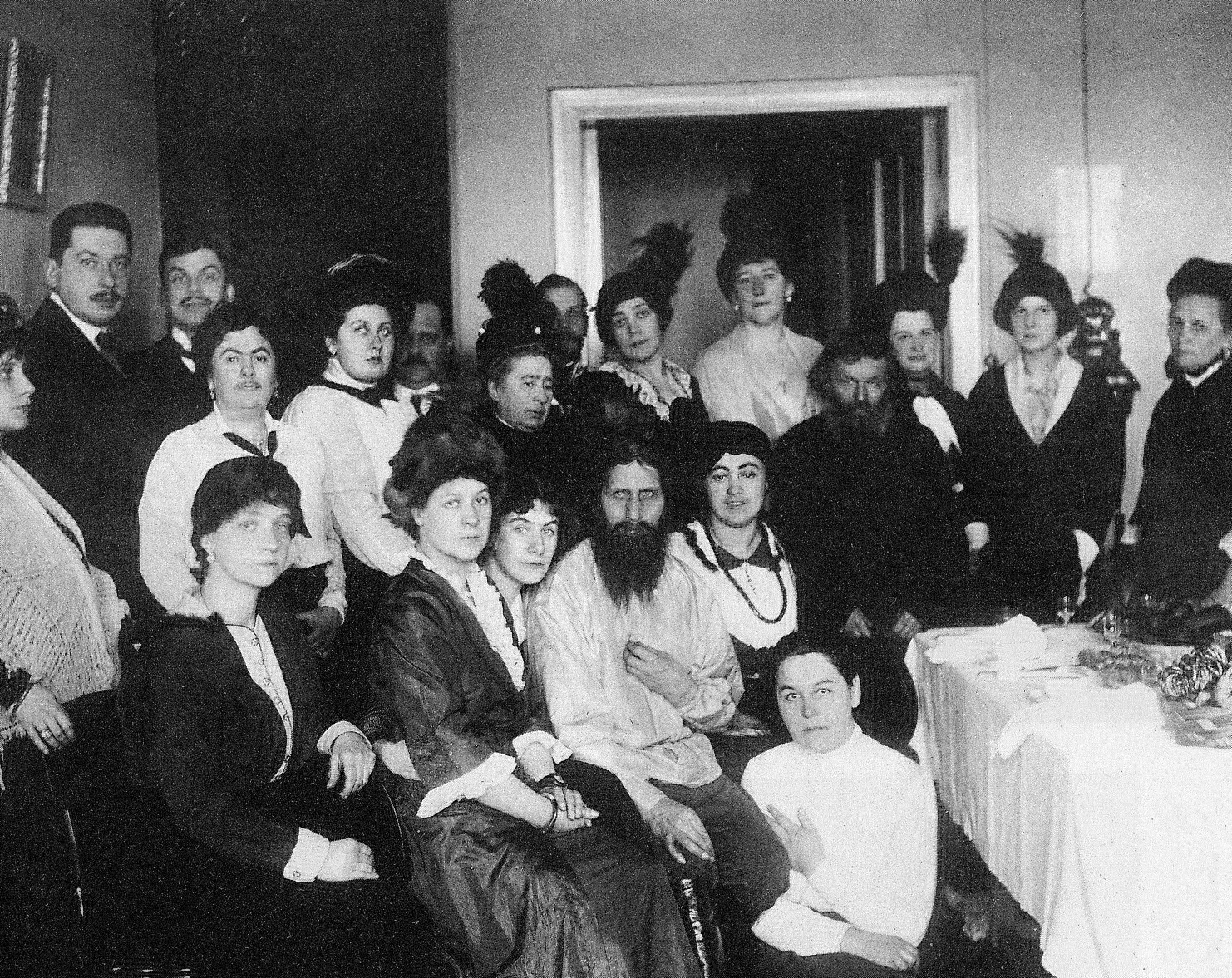 Rasputin among admirers, 1914 The imperial family's belief in Rasputin's healing powers brought him considerable status and power at court.[65] Nicholas appointed Rasputin his lampadnik (lamplighter), charged with keeping the lamps lit before religious icons in the palace, which gained him regular access to the palace and imperial family.[66] By December 1906, Rasputin had become close enough to ask a special favor of the tsar: that he be permitted to change his surname to Rasputin-Noviy (Rasputin-New). Nicholas granted the request and the name change was speedily processed, suggesting that Rasputin already had the tsar's favor at that early date.[36] Rasputin used his position to full effect, accepting bribes and sexual favors from admirers[65] and working diligently to expand his influence. Rasputin soon became a controversial figure; he was accused by his enemies of religious heresy and rape, was suspected of exerting undue political influence over the tsar and was even rumored to be having an affair with the tsarina.[67] Opposition to Rasputin's influence grew within the Eastern Orthodox Church. In 1907, the local clergy in Pokrovskoye denounced Rasputin as a heretic, and the Bishop of Tobolsk launched an inquest into his activities, accusing him of "spreading false, Khlyst-like doctrines".[68] In Saint Petersburg, Rasputin faced opposition from even more prominent critics, including Prime Minister Pyotr Stolypin and the Okhrana, the tsar's secret police.[69] Having ordered an investigation into Rasputin's activities, Stolypin confronted Nicholas but did not succeed in reining in Rasputin's influence or exiling him from Saint Petersburg.[70] Outside of the royal court, Rasputin preached that physical contact between him and others purified them; he engaged in drunken revels and extramarital affairs with a wide range of women from prostitutes to high-society ladies.[71][72] In 1909, Khioniya Berlatskaya, one of Rasputin's early supporters, accused him of rape. Betlatskaya sought aid from Theofan, who became convinced that Rasputin was a danger to the monarchy.[73] Rumors multiplied that Rasputin had assaulted female followers and behaved inappropriately on visits with the imperial family—and particularly with Nicholas's teenage daughters Olga and Tatiana.[74][75] 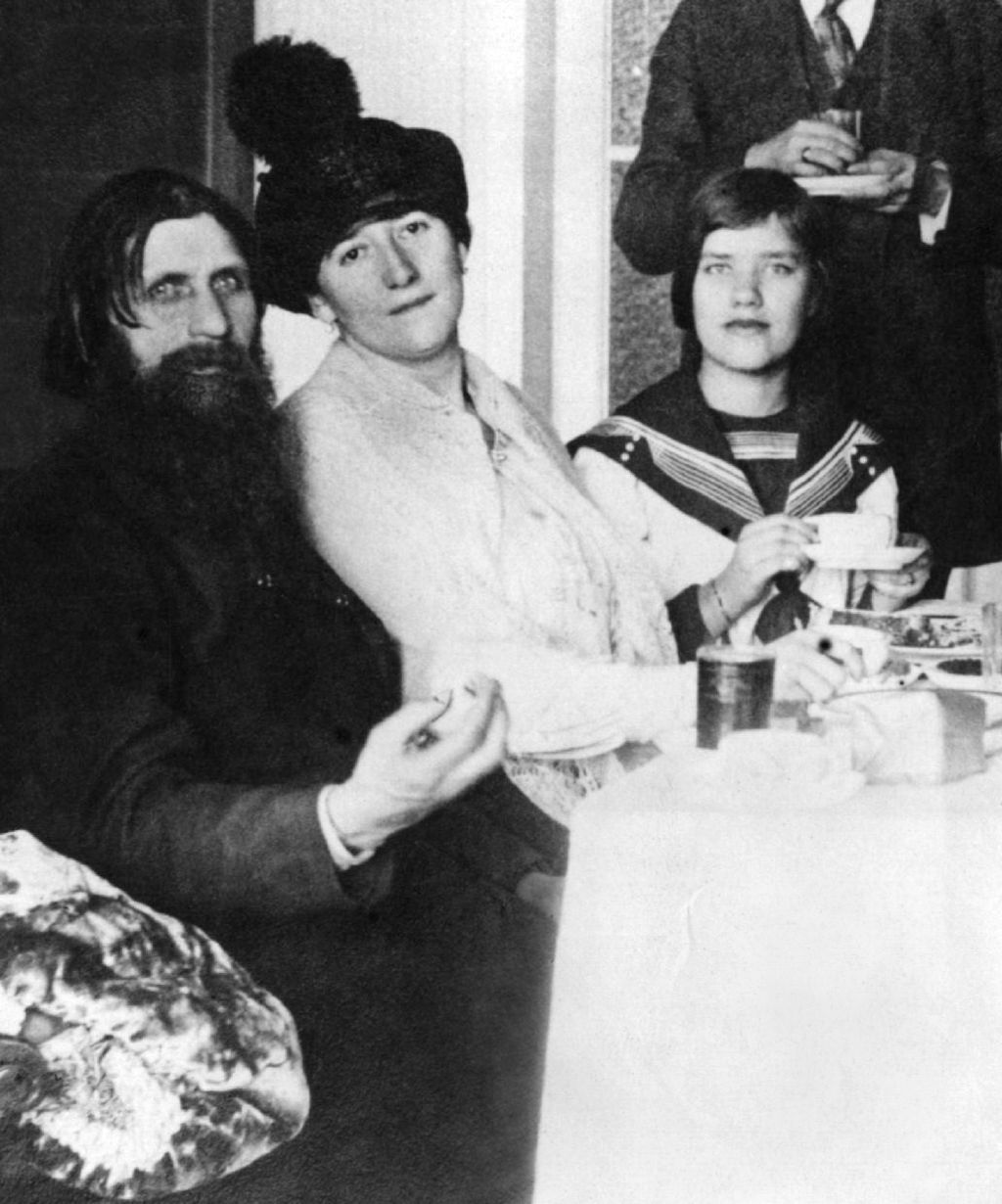 Rasputin with his daughter Maria (rightmost), in his St. Petersburg apartment, 1911 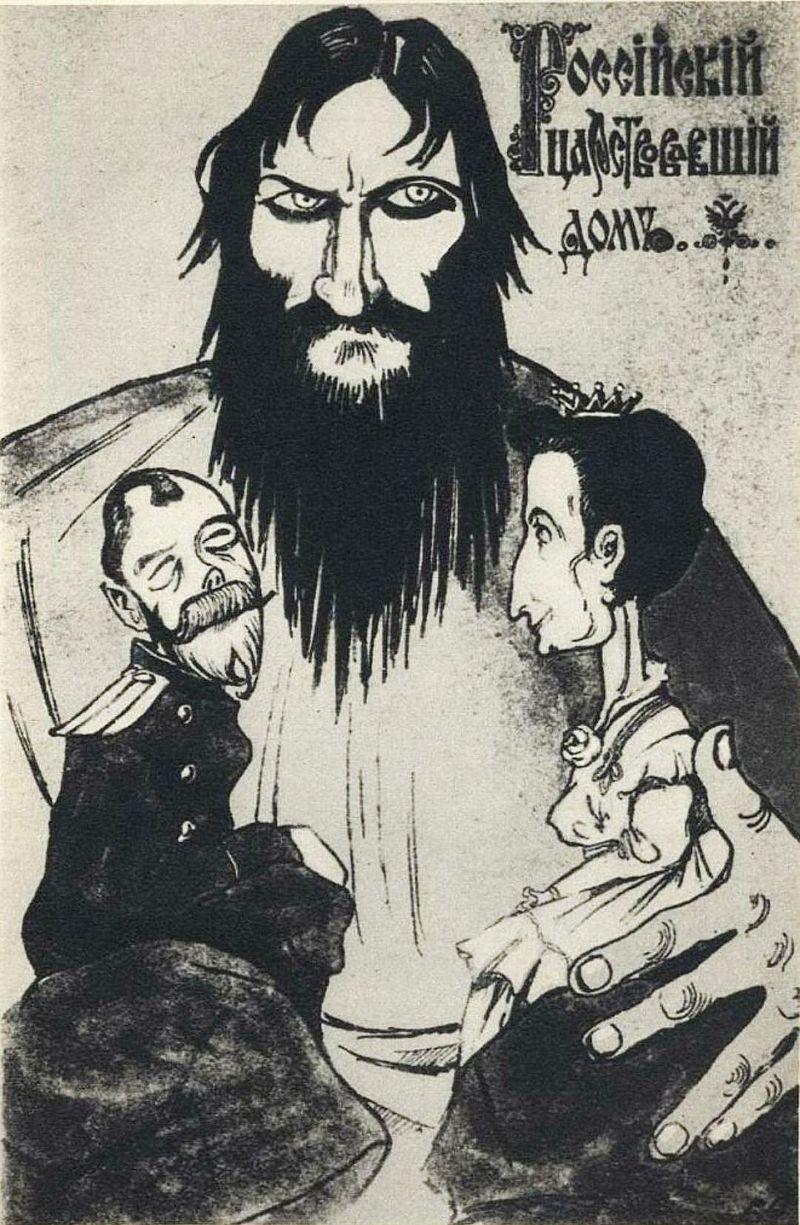 Caricature of Rasputin and the imperial couple, 1916 During this period the First World War, the dissolution of feudalism and a meddling government bureaucracy all contributed to Russia's rapid economic decline. Many laid the blame on Alexandra and Rasputin. One outspoken member of the Duma, far-right politician Vladimir Purishkevich, stated in November 1916 that he held the tsar's ministers had "been turned into marionettes, marionettes whose threads have been taken firmly in hand by Rasputin and the Empress Alexandra Fyodorovna—the evil genius of Russia and the Tsarina… who has remained a German on the Russian throne and alien to the country and its people".[76] (The tsarina had been born a German princess.) |
論争 ラスプーチンを崇拝する人々(1914年 ニコライはラスプーチンをランパドニク(ランプを灯す者)に任命し、宮殿の宗教的イコンの前にランプを灯し続けるよう命じた。ニコライはこの要求を許可 し、改名は迅速に処理された。このことは、ラスプーチンがこの早い時期にすでに皇帝の寵愛を受けていたことを示唆している[36]。ラスプーチンはその地 位を最大限に利用し、崇拝者たちから賄賂や性的な好意を受け取り[65]、自分の影響力を拡大するために熱心に働いた。 ラスプーチンはすぐに物議を醸す人物となった。彼は敵から宗教的異端と強姦で告発され、皇帝に過度の政治的影響力を及ぼしていると疑われ、ツァリーナと不 倫関係にあるとまで噂された[67]。ラスプーチンの影響力に対する反対は東方正教会内で高まった。1907年、ポクロフスコエの地元の聖職者たちはラス プーチンを異端者として糾弾し、トボリスクの司教は彼の活動について調査を開始し、「誤った、クリストのような教義を広めている」と非難した[68]。 [サンクトペテルブルクでは、ラスプーチンは首相ピョートル・ストーリピンや皇帝の秘密警察であるオクラナなど、さらに著名な批評家たちの反対に直面した [69]。ラスプーチンの活動に関する調査を命じたストーリピンはニコライと対立したが、ラスプーチンの影響力を抑えたり、サンクトペテルブルクから追放 したりすることには成功しなかった[70]。 1909年、ラスプーチンの初期の支持者の一人であったキオニヤ・ベルラツカヤは、ラスプーチンを強姦罪で訴えた。ベトラツカヤはテオファンに援助を求 め、テオファンはラスプーチンが王政にとって危険な存在であると確信した[73]。 ラスプーチンが女性信者を暴行し、皇室、特にニコライの10代の娘オルガとタチアナとの面会で不適切な振る舞いをしたという噂が広まった[74] [75]。  娘マリア(一番右)とラスプーチン(1911年、サンクトペテルブルクのアパートにて  ラスプーチンと皇帝夫妻の風刺画、1916年 この時期、第一次世界大戦、封建制の解体、お節介な政府官僚主義が、ロシアの急速な経済衰退の原因となった。その責任をアレクサンドラとラスプーチンにな すりつける者も少なくなかった。極右政治家のウラジーミル・プリシュケヴィチは、1916年11月、ツァーリの閣僚たちは「マリオネットと化した。その糸 は、ラスプーチンと女帝アレクサンドラ・フョードロヴナ、すなわちロシアの悪の天才とツァーリナによってしっかりと手中に収められた。 |
| Failed assassination attempt On 12 July [O.S. 29 June] 1914, a 33-year-old peasant woman named Khioniya Guseva attempted to assassinate Rasputin by stabbing him in the stomach outside his home in Pokrovskoye.[77] Rasputin was seriously wounded, and for a time it was not clear if he would survive.[78] After surgery[79] and some time in a hospital in Tyumen,[80] he recovered. Guseva was a follower of Iliodor, a former priest who had supported Rasputin before denouncing his sexual escapades and self-aggrandizement in December 1911.[81][82] A radical conservative and anti-semite, Iliodor had been part of a group of establishment figures who had attempted to drive a wedge between Rasputin and the imperial family in 1911. When this effort failed, Iliodor was banished from Saint Petersburg and was ultimately defrocked.[81][83] Guseva claimed to have acted alone, having read about Rasputin in the newspapers and believing him to be a "false prophet and even an Antichrist".[84] Both the police and Rasputin, however, believed that Iliodor had instigated the assassination attempt.[81] Iliodor fled the country before he could be questioned, and Guseva was found to be not responsible for her actions by reason of insanity.[81] |
暗殺未遂の失敗 1914年7月12日[O.S. 6月29日]、キオニヤ・グセーヴァという33歳の農民の女性が、ポクロフスコエの自宅の外でラスプーチンの腹を刺して暗殺しようとした。 グセヴァはイリオドールの信奉者であった。イリオドールは元神父であり、1911年12月にラスプーチンの性的逃避と自己顕示欲を糾弾するまではラスプー チンを支持していた。急進的な保守主義者であり反ユダヤ主義者であったイリオドールは、1911年にラスプーチンと皇室の間にくさびを打ち込もうとした権 力者グループの一員であった。この取り組みが失敗すると、イリオドールはサンクトペテルブルクから追放され、最終的に脱退させられた[81][83]。グ セヴァは、新聞でラスプーチンについて読み、彼を「偽預言者、さらには反キリスト」と信じて単独で行動したと主張した。 [しかし、警察もラスプーチンもイリオドールが暗殺未遂を扇動したと考えていた[81]。イリオドールは取り調べを受ける前に国外に逃亡し、グセヴァは心 神喪失を理由に自分の行動に責任はないとされた[81]。 |
Death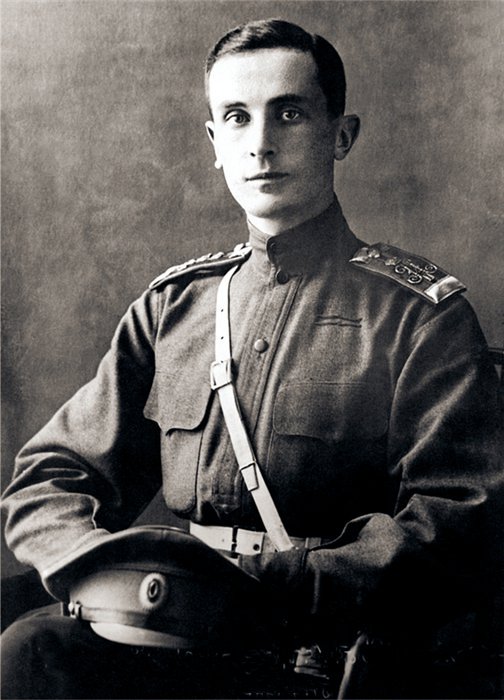 Felix Yusupov, husband of Princess Irina Aleksandrovna Romanova, the Tsar's niece, 1914 A group of nobles led by Purishkevich, Grand Duke Dmitri Pavlovich and Prince Felix Yusupov decided that Rasputin's influence over Alexandra threatened the Russian Empire. They concocted a plan in December 1916 to kill Rasputin, apparently by luring him to the Yusupovs' Moika Palace.[85][86] 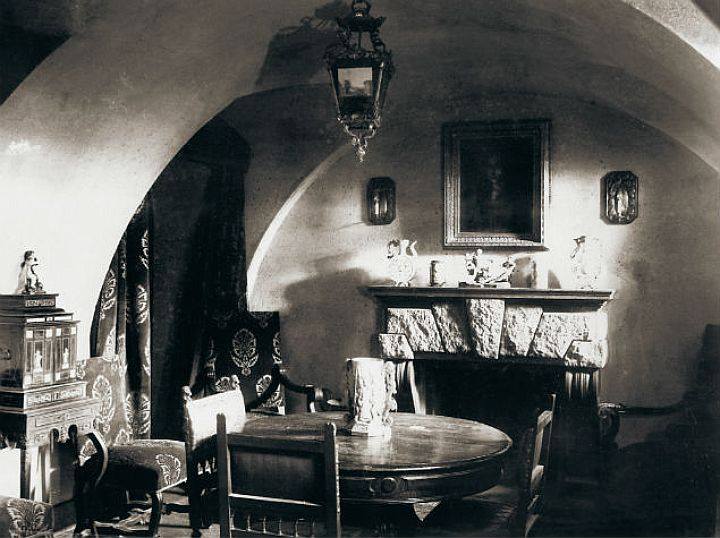 Basement of the Yusupov Palace on the Moika in St. Petersburg where Rasputin was murdered  The wooden Bolshoy Petrovsky Bridge from which Rasputin's body was thrown into the Malaya Nevka River Rasputin was murdered during the early morning on 30 December [O.S. 17 December] 1916 at the home of Prince Yusupov. He died of three gunshot wounds, one of which was a close-range shot to his forehead. Little is certain about his death beyond this, and the circumstances of his death have been the subject of considerable speculation. According to Smith, "what really happened at the Yusupov home on 17 December will never be known".[87] The story that Yusupov recounted in his memoirs, however, has become the most frequently told version of events.[88] 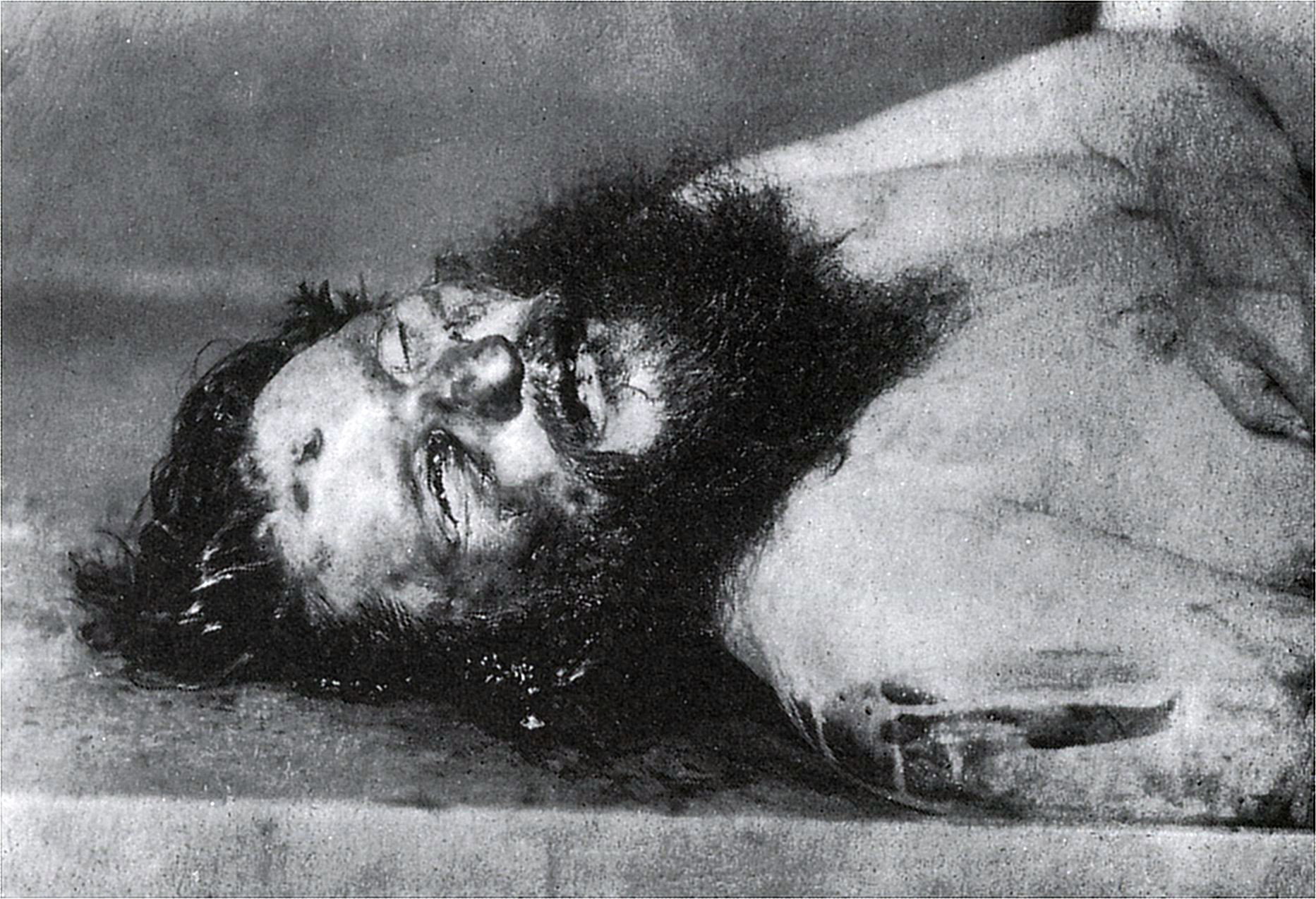 Rasputin's corpse on the ground with a bullet wound visible in his forehead According to Yusupov's account, Rasputin was invited to his palace shortly after midnight and ushered into the basement. Yusupov offered tea and cakes which had been laced with cyanide. After initially refusing the cakes, Rasputin began to eat them and, to Yusupov's surprise, appeared unaffected by the poison.[89] Rasputin then asked for some Madeira wine (which had also been poisoned) and drank three glasses, but still showed no sign of distress.[n 1] At around 2:30 am, Yusupov excused himself to go upstairs, where his fellow conspirators were waiting. He took a revolver from Pavlovich, then returned to the basement and told Rasputin that he'd "better look at the crucifix and say a prayer", referring to a crucifix in the room, then shot him once in the chest. The conspirators then drove to Rasputin's apartment, with Sukhotin wearing Rasputin's coat and hat in an attempt to make it look as though Rasputin had returned home that night.[90] Upon returning to his palace, Yusupov went back to the basement to ensure that Rasputin was dead.[91] Suddenly, Rasputin leaped up and attacked Yusupov, who freed himself with some effort and fled upstairs. Rasputin followed Yusupov into the palace's courtyard, where he was shot by Purishkevich. He collapsed into a snowbank. The conspirators then wrapped his body in cloth, drove it to the Petrovsky Bridge and dropped it into the Little Nevka river.[92] In an unsubstantiated claim, Grand Duchess Tatiana, who was earlier alleged to have been raped by Rasputin, was present at the site of Rasputin's murder, "disguised as a lieutenant of the Chevaliers-Gardes, so that she could revenge herself on Rasputin who had tried to violate her". Maurice Paléologue, the French ambassador to Russia, wrote that Tatiana had supposedly witnessed Rasputin's castration, but he doubted the credibility of the rumor.[93] In a modern analysis of Rasputin's death, published on the 100th anniversary of the event, Dr Carolyn Harris of the University of Toronto notes that the actual circumstances were apparently less dramatic than Yusupov's account. Rasputin's daughter recorded that her father disliked sweet food and would not have eaten the supposedly poisoned cakes. An autopsy account by the official surgeon involved has no record of poisoning or drowning but simply records death by a single bullet fired into the head at close range.[94] Death and aftermath News of Rasputin's murder spread quickly, even before his body was found. According to Smith, Purishkevich spoke openly about the murder to two soldiers and to a policeman who was investigating reports of shots shortly after the event, but urged them not to tell anyone else.[95] An investigation was launched the next morning.[96] The Stock Exchange Gazette ran a report of Rasputin's death "after a party in one of the most aristocratic homes in the center of the city" on the afternoon of 30 December [O.S. 17 December] 1916. After two workmen discovered blood on the railing of the Petrovsky Bridge and a boot on the ice below, police began searching the area.[97] Rasputin's body was found under the river ice on 1 January (O.S. 19 December) approximately 200 meters downstream from the bridge.[98] Dmitry Kosorotov, the city's senior autopsy surgeon, examined the body. Kosorotov's report was lost, but he later stated that Rasputin's body had shown signs of severe trauma, including three gunshot wounds (one at close range to the forehead), a slice wound to his left side and other injuries, many of which Kosorotov felt had been sustained post-mortem.[99] Kosorotov found a single bullet in Rasputin's body but stated that it was too badly deformed and of a type too widely used to trace. He found no evidence that Rasputin had been poisoned.[100] According to both Smith and Fuhrmann, Kosorotov found no water in Rasputin's lungs and reports that Rasputin had been thrown into the water alive were incorrect.[101][102] Some later accounts claimed that Rasputin's penis had been severed, but Kosorotov found his genitals intact.[100] Rasputin was buried on 2 January (O.S. 21 December) at a small church that Vyrubova had been building at Tsarskoye Selo. The funeral was attended only by the imperial family and a few of their intimates. Rasputin's wife, mistress and children were not invited,[103] although his daughters met with the imperial family at Vyrubova's home later that day.[104] The imperial family planned to build a church over Rasputin's grave site.[64] However, his body was exhumed and burned by a detachment of soldiers on the orders of Alexander Kerensky shortly after Nicholas abdicated the throne in March 1917,[103] so that his grave would not become a rallying point for supporters of the old regime.[105] |
死 フェリックス・ユスポフ、イリーナ・アレクサンドロヴナ・ロマノワ王女(ツァーリの姪)の夫、1914年 プリシュケヴィチ、ドミトリー・パヴロヴィチ大公、フェリックス・ユスポフ皇太子を中心とする貴族グループは、アレクサンドラに対するラスプーチンの影響 力がロシア帝国を脅かすと判断した。彼らは1916年12月、ラスプーチンをユスポフ家のモイカ宮殿に誘い込んで殺害する計画を練ったようだ[85] [86]。  ラスプーチンが殺害されたサンクトペテルブルクのモイカにあるユスポフ宮殿の地下室  ラスプーチンの遺体がマラヤ・ネフカ川に投げ込まれた木造のボリショイ・ペトロフスキー橋(2007年の撮影か) ラスプーチンは1916年12月30日[西暦12月17日]の早朝、ユスポフ公の家で殺害された。彼の死因は3発の銃創で、そのうちの1発は額への至近距 離からの銃弾であった。彼の死について、これ以上のことはほとんどわかっておらず、死の状況はかなりの憶測を呼んでいる。スミスによれば、「12月17日 にユスポフ家で実際に何が起こったのかは決して知られることはない」[87]。しかし、ユスポフが回想録で語った話は、最も頻繁に語られる事件のバージョ ンとなっている[88]。  額に銃創が見えるラスプーチンの死体 ユスポフの証言によれば、ラスプーチンは真夜中過ぎに宮殿に招かれ、地下室に案内された。ユスポフは青酸カリを混ぜたお茶とケーキを差し出した。その後、 ラスプーチンはマデイラワイン(これも毒入り)を所望し、グラス3杯を飲んだが、苦痛の兆候はなかった[n 1] 午前2時30分頃、ユスポフは席を外し、共謀者たちが待つ2階に上がった。彼はパブロヴィチからリボルバーを受け取り、地下室に戻り、部屋にあった十字架 を指して「十字架を見て祈りを捧げたほうがいい」とラスプーチンに告げ、胸を一発撃った。謀議者たちはその後、ラスプーチンのアパートまで車で移動し、ス コーチンはラスプーチンのコートと帽子を着用して、ラスプーチンがその夜帰宅したように見せかけた[90]。宮殿に戻ったユスポフは、ラスプーチンが死ん だことを確認するために地下室に戻った[91]。突然、ラスプーチンが飛び上がってユスポフに襲いかかったが、ユスポフは苦労して体を解放し、2階に逃げ た。ラスプーチンはユスポフを追って宮殿の中庭に入り、そこでプリシュケヴィチに撃たれた。彼は雪山に倒れ込んだ。陰謀家たちはその後、彼の遺体を布で包 み、ペトロフスキー橋まで車で運び、ネフカ川に落とした[92]。 根拠のない主張では、以前ラスプーチンに強姦されたとされる大公妃タチアナは、「自分を犯そうとしたラスプーチンに復讐するために、シュヴァリエ・ガルド の中尉に変装して」ラスプーチンの殺害現場に立ち会った。駐ロシアフランス大使のモーリス・パレオローグは、タチアナがラスプーチンの去勢を目撃したとさ れているが、彼はその噂の信憑性を疑っている[93]。 この事件の100周年記念日に出版されたラスプーチンの死に関する現代的な分析の中で、トロント大学のキャロライン・ハリス博士は、実際の状況はユスポフ の説明よりも劇的ではなかったと述べている。ラスプーチンの娘は、父親は甘いものが嫌いで、毒入りとされるケーキを食べなかったと記録している。関係者の 外科医による検死記録には、毒殺や溺死の記録はなく、至近距離から頭部に発射された1発の銃弾による死亡と記録されているだけである[94]。 死と余波 ラスプーチン殺害のニュースは、彼の遺体が発見される前から急速に広まった。スミスによると、プリシュケビッチは事件直後に2人の兵士と発砲の報告を調査 していた警官に殺害について率直に話したが、他の誰にも話さないように促した[95]。 翌朝、調査が開始された[96]。 証券取引所報』は1916年12月30日(西暦12月17日)の午後、「市の中心部にある最も貴族の邸宅の一つでのパーティーの後」にラスプーチンが死亡 したという報告を掲載した。 2人の作業員がペトロフスキー橋の手すりに付着した血痕と下の氷の上に置かれた長靴を発見した後、警察は付近の捜索を開始した[97] 。ラスプーチンの遺体は1月1日(西暦12月19日)、橋から約200メートル下流の川の氷の下で発見された[98] 。市の上級検死医ドミトリー・コソロトフが遺体を検視した。コソロトフの報告書は紛失したが、後に彼は、ラスプーチンの遺体には3発の銃創(1発は額に至 近距離から)、左脇腹の切り裂き傷、その他の傷を含む激しい外傷の痕跡があり、その多くはコソロトフが死後に負ったものであると感じたと述べている [99]。コソロトフはラスプーチンの遺体から1発の銃弾を発見したが、それはあまりにひどく変形しており、追跡するにはあまりに広く使われているタイプ のものであったと述べている。彼はラスプーチンが毒殺されたという証拠を発見しなかった[100]。 スミスとフアーマンの両者によると、コソロトフはラスプーチンの肺に水を発見せず、ラスプーチンが生きたまま水に投げ込まれたという報告は誤りであった [101][102]。 ラスプーチンの陰茎が切断されたという後世の証言もあるが、コソロトフは彼の性器が無傷であることを発見した[100]。 ラスプーチンは1月2日(O.S.12月21日)、ヴィルヴォヴァがツァールスコエ・セローに建設していた小さな教会に埋葬された。葬儀には皇族と数人の 親しい人々だけが参列した。ラスプーチンの妻、愛人、子供たちは招待されなかったが[103]、彼の娘たちはその日のうちにヴィルヴォヴァの自宅で皇族と 面会した[104]。 [64]しかし、ニコライが1917年3月に退位した直後、彼の遺体はアレクサンドル・ケレンスキーの命令で兵士の分隊によって掘り起こされ、焼却された [103]。 |
| Prominent children Maria Rasputin Rasputin's daughter, Maria Rasputin (born Matryona Rasputina; 1898–1977), emigrated to France after the October Revolution and then to the United States. There, she worked as a dancer and then a lion tamer in a circus.[106] |
著名な子供たち マリア・ラスプーチン ラスプーチンの娘マリア・ラスプーチン(マトリオーナ・ラスプーチナ、1898-1977)は、十月革命後にフランスに移住し、その後アメリカに渡った。そこでダンサーとして働いた後、サーカスでライオンの調教師として働いた[106]。 |
| https://en.wikipedia.org/wiki/Grigori_Rasputin |
リ ンク
文 献
そ の他の情報
Copyleft, CC, Mitzub'ixi Quq Chi'j, 1996-2099
☆
 ☆
☆